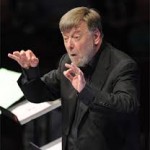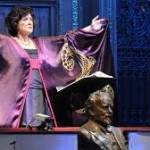 Richard Hills’ Light organ prom was a triumph!
Richard Hills’ Light organ prom was a triumph!
Last year Cameron Carpenter gave a pair of highly entertaining Bach related concerts on “The Voice of Jupiter” as part of the Proms Season. This year’s organ Prom saw further imaginative use of the Hall’s grand organ by another entertaining and highly skilled organist.
From the start it was clear that this concert was intended to highlight a different side of organ music, and in doing so, developing a longstanding tradition of lighter music at the Proms and celebrating the Town Hall and Theatre Organ genres. There were other pointers to this being a different sort of organ concert. There was a female assistant and the most mixed audience in terms of age, ethnicity and gender that I have ever been a part of at an organ event! It was clear that as well as the die-hard promenaders this concert had also attracted many music lovers including some families taking advantage of the timing of a Bank Holiday Monday afternoon.
Eric Coates’ Sound & Vision- a march written as a signature tune for ATV – got the proceedings off to a rousing start with fanfare introduction, breezy pace and stirring conclusion. Richard’s own selection of music from Sullivan’s Mikado gave a chance to highlight some of the more subtle stops. This was a roller-coaster ride combining wit and pathos as well as some more martial moments.
The point was made that the organ here in the Hall was a concert organ and not a theatre organ. The programme reflected this with most pieces being drawn from the light orchestral repertoire. Two pieces originally written as piano solos were the exception where Richard’s fine theatre stylings shone through – Billy Mayerl’s Ace of Hearts and “Fats” Waller’s A Handful of keys. The first featured some beautifully delicate echo effects as well as selective use of tuned percussion and the second a brilliant dancing bassline. German’s Three dances from ‘Nell Gwyn’ saw a return to the light orchestral repertoire and again employed a wide range of colours.
A wonderfully restrained performance of Ireland’s Villanella was the only piece of music originally written for the organ and made the point that many players and composers in the past have been comfortable in more than one genre.
The programme ended with an inventive rendition of Quilter’s A Children’s Overture, itself a highly entertaining piece drawing on familiar (and less so) nursery rhymes. The myriad resources of the organ were expertly drawn upon once again and certain sections sounded particularly organ-esque in their own right, notably the gigue-like A frog he would a-wooing go!
This would have been a satisfying ending but it was topped by Mr Hills’ highly entertaining encore Tiger Rag. This was a skilfull rendition beginning with a fast tempo but otherwise understated. The music built throughout as it moved through various guises including some humorous effects and interesting registration. There were brief cameos of Widor’s Toccata & Elgar’s Pomp & Circumstance (what else, in a Prom encore?).
Richard’s keen musicianship, dexterous technique and ability to entertain were to the fore. Encore! SP












